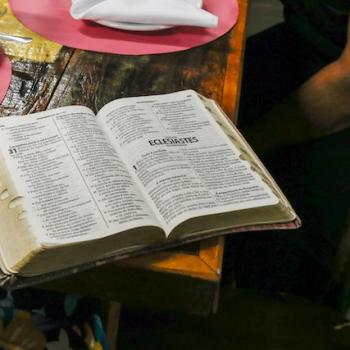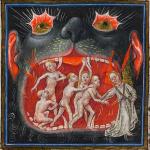I had only been a Christian for a few months when our church experienced something amazing. A woman came to the church elders, asked for prayer, and stood on her extremely strong faith. The pastor and elders directly laid hands on her while the entire church extended their hands in agreement. Together, we prayed and agreed for her healing from cancer. This was her second or third experience with a serious ailment…and she was thoroughly convinced she’d be healed. The following week, she returned with her testimony: her Muslim doctor looked at her scans, said “You’re a Christian, aren’t you?” and told her to get out of his office. She no longer needed his medical care. In keeping with her faith, she was healed. We felt our understanding of God’s unconditional love fall on us!

She saw a miracle; we saw a miracle. As a church, it felt like our miracle as much as hers, because we stood and believed for it. We also drew on her miracle because many of us were believing for different things in our own lives. The majority of these things came and went without a miraculous result. Some believed God for new jobs or promotions. There were people earnestly standing in the gap for unsaved or troubled family members. Others longed for familial reconciliations or to resolve issues in their marriages. Still, some believed for greater or bigger visions for ministry. Most of us wanted God to move through us in mighty and miraculous ways, thinking the “working of miracles” to be a great place to start.
Great faith was our focus. Unconditional love wasn’t on our radar. In an even bigger way, none of us considered what God’s unconditional love meant to us.
When reality creeps in
We had great faith; we didn’t have a lot of love. Love, after all, wasn’t something that would draw crowds. When push came to shove, the church was still full of people, full of the human condition. Many of our members didn’t always act as Spirit-filled as they claimed to be. We all hoped we would be the ones who would work the miracles. Nobody wanted to be the one to answer for why someone didn’t receive one. If anything, we avoided that question. We believed we would be the ones to see miracles. We weren’t going to have to face God, day in and day out, without what we wanted.
Life passed from season to season and miracles came, but often went without a church-wide impact. If anything, the next several years would be hard on that little church. The pastor left. To follow, the church fell into schism for the second time in its twelve-year existence. A few strong members died, including the woman who brought me to the Lord. She believed God for years for her healing from Parkinson’s Disease. At least this side of heaven, her healing never materialized.
Our deepest, understated hope: God would heal the human condition. Miracles would abound in such abundance that they would fix everything wrong with our lives. We loved the presence of God (being in a space where God met needs), but we never walked in the glory of God (loving God for Who He is). Our expectation was for God to meet needs to prove He loved us. None of us ever thought about what our love to God should look like. In hindsight, I don’t feel we considered God – and His perspective – enough in our interactions with Him.
God has feelings, too!
Recently at Sanctuary (my church in Charlotte) we studied Jeremiah 16. Anyone who has ever studied the prophets in detail – especially in the context of a chapter at a time, giving pause to think about text – knows they are full of very strong words. The contents are both spiritual and emotional in nature. The emotions described aren’t just those of the humans involved, but also those of God. God’s experience, spoken through the prophets, ranges from jealous and scorned lover to sorrowful partner, One Who is left at a loss in the wake of terrible offenses committed against Him.
We don’t often read Scripture and think, “Gee, I wonder how the Israelites made God feel” or “Wow, God must have had some strong feelings to express His words so powerfully.” No, we look at Scripture and we try to pick out the parts, dissect the parts that cause us the least bit of challenge when it comes to our relationship with God. Our focus is the embrace of passages that make us feel positive and seen. When it comes to dealing with relationship – our call to consider how our actions might impact God – we skip over those. We assume if God is going to do something, it should be miraculous…show-stopping…something that intervenes in the natural order of life, without thought or commitment. This would “prove” He loves us unconditionally, right?
Working in unconditional love through human nature
“When you tell these people all this and they ask you, ‘Why has the Lord decreed such a great disaster against us? What wrong have we done? What sin have we committed against the Lord our God?’ then say to them, ‘It is because your ancestors forsook Me,’ declares the Lord, ‘and followed other gods and served and worshiped them. They forsook Me and did not keep My law. But you have behaved more wickedly than your ancestors. See how all of you are following the stubbornness of your evil hearts instead of obeying Me. So I will throw you out of this land into a land neither you nor your ancestors have known, and there you will serve other gods day and night, for I will show you no favor.’ (Jeremiah 16:10-13, NIV)
I think the bigger question we are forced to face is why do we assume God’s unconditional love should compensate for our lack of love? Whether it is our lack of love toward God our our lack of love toward others, why should God constantly look the other way, overcompensate, or intervene to undo our human nature? What is wrong with stepping back, not intervening, and letting human beings sort out their issues? By letting humans be humans, God still proves He is God. This is true whether we get a huge miracle, or not.
God’s love when there are no miracles
I believe in miracles. Within my understanding, miracles are as relevant and active today as they were in Biblical times. I also believe that, if we look at the Bible, miracles didn’t exist to undo the human condition, which is too often what we hope they will do. This is as true for us as it was for Israel back in the day. Israel knew God in miracles, whether they knew from their own experiences (a personal touch or a witness to one) or in testimony of their history with God, as a people. They knew God was mighty and could do amazing things, but they didn’t know God despite themselves.
All the signs in the world didn’t give them the heart to love God as they should, because signs didn’t cure the human condition. They point to God, they show His ability and His nature, and they might even dazzle and shock a bit, but they are, indeed a starting point. They don’t replace the day-in, day out call we have to find God in both our ordinary as well as our extraordinary.
A look at the prophets
If we honestly study the prophets, we will see there aren’t many recorded miracles in the prophetic books. Sure, such are acknowledged, but in the book of Jeremiah, for example, there are no records he ever performed a single miracle. While many today would require a prophet to be a miracle worker, Jeremiah wasn’t; far from it. If anything, Jeremiah’s word was as heavy and intense as his personality. His word from God revealed an entirely different view of God than we see in earlier writings, such as Exodus or Deuteronomy.
Jeremiah’s picture of God is not as an endless miracle worker, guiding His people with a certain level of intimacy and comfort. Instead, God is seen as a God Who doesn’t do for us what we can do for ourselves. God isn’t a different deity. His unconditional love isn’t absent. His people, however, and what they want, is different. They are no longer a wandering tribal group, eating bread from the sky in the desert. Now, we see a weak and crumbling nation. They’ve been through a number of judges and kings, split into two, and fallen into idolatry repeatedly. They want to chase after other gods, reaping their benefits, while expecting God to look the other way at their deliberate missteps.
Who was in the wrong?
While people sit back and think it was wrong of God to let the Israelites have the results of their pursued idolatry, they don’t consider the people failed to follow God’s boundaries. God had to allow them the experience of working things out themselves. Through the actions of other nations, God’s will came about. It didn’t happen through miracles, but a steady, consistent experience. This experience challenged Israel to examine itself (instead of blaming others). If they didn’t want to follow God, God wasn’t going to force them to do so. By stepping aside and allowing them to experience the consequences of their choices, God showed His unconditional love to Israel.
Have what you want…but don’t expect the benefits of God if you want the results of an idol.
God’s unconditional love in human experiences
God let Israel walk through the results of their actions because He loved them. He lets us do the same, day in and day out, for the same reason. In those places, we experience the unconditional love of God the most: right where we don’t get miracles, but instead, the results of human behavior. As we walk through the result of consequences, we experience God long-term. We cry out; He doesn’t rescue us. He walks beside us, with us, through it, in it.
When in these states, we demand a miracle. Our expectation is that God should prove Himself to us; but God doesn’t. He patiently waits for us to come to the end of ourselves so we can find Him so we can reconcile ourselves. We need to see what we do does to Him as well as what it does to others. In our trial, in our struggle, we find God to be our constant presence and help in ways we don’t recognize without such an experience.
Over the years I’ve been Christian, I have seen far more people not get what they want from God than those who do. Some believe for years, holding on to their vision. Eventually, many move on, hoping for different things to manifest. Sometimes their understanding changes and they want something different than they once did. Most of the time, we continue the cycle. We believe God to deliver us from human nature, not seeing the way He draws us to Himself through it.
The unconditional love of God remains while we go through
Whether it’s through the occupation of a nation (as happened in the prophets) or through the changes that life offers (people leaving, friendships ending, issues on the job, familial discord, etc.), God’s love toward us doesn’t change. If we refuse to choose Him, He lets us follow our hearts unto wherever they lead. And, like the people of old, He remains right there with us, as we learn to hear from Him, big or small, through the things of life that challenge us the most.


















